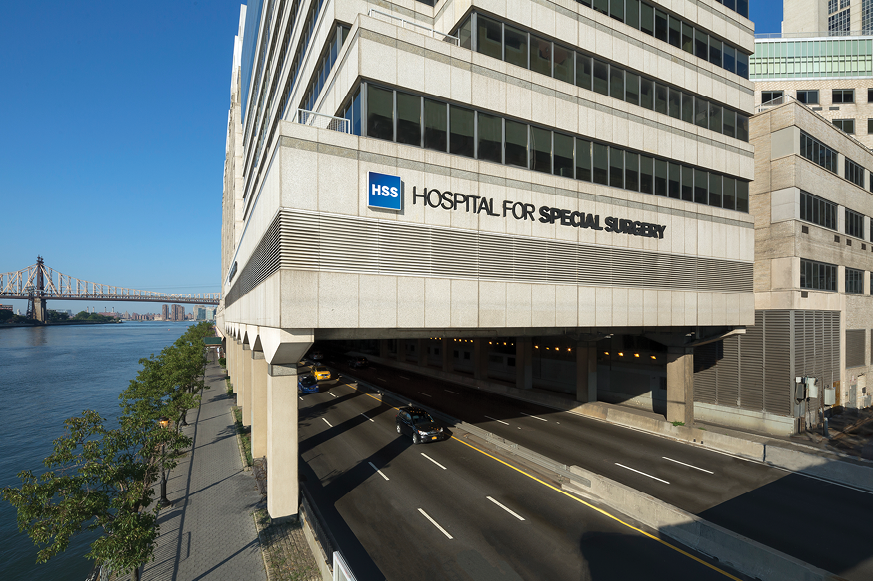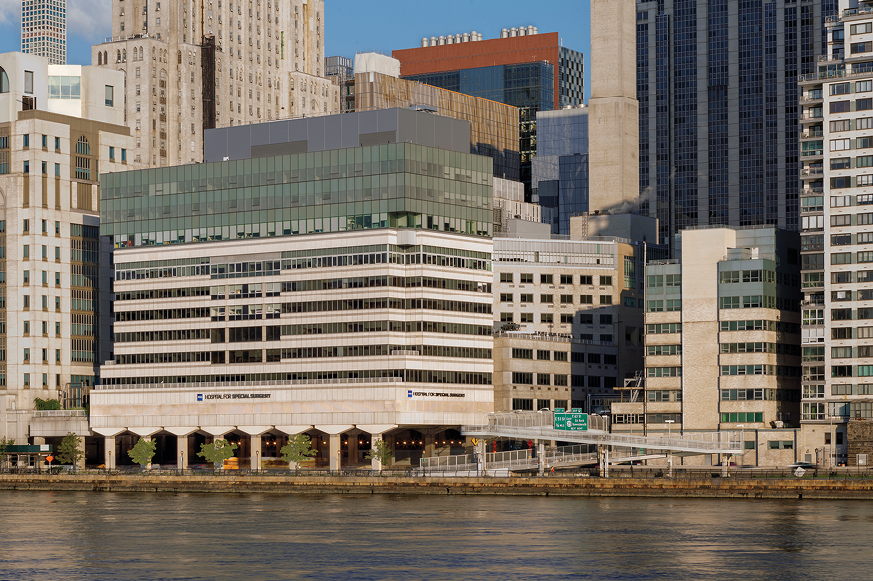- Home
- Media Kit
- MediaJet
- Current Issue
- Past Issues
- Ad Specs-Submission
- Ad Print Settings
- Reprints (PDF)
- Photo Specifications (PDF)
- Contact Us
![]()
ONLINE
![]()
ONLINE

Research, Innovation
and Education
Editors’ Note
Lou Shapiro assumed his current position in October 2006. Previously, he served as Executive Vice President and Chief Operating Officer of Geisinger Health System’s Clinical Enterprise. He began his career at Allegheny General Hospital in Pittsburgh and then joined McKinsey & Company as a leader within their healthcare practice. Shapiro is a fellow of the American College of Healthcare Executives, former Chair of the Greater New York Hospital Association Board of Governors (2014-2015), and serves on multiple nonprofit boards.
Institution Brief
HSS (hss.edu) is the world’s leading academic medical center focused on musculoskeletal health. At its core is Hospital for Special Surgery, nationally ranked No. 1 in orthopedics (for the twelfth consecutive year) and No. 4 in rheumatology by U.S. News & World Report (2021-2022), and named a leader in pediatric orthopedics by U.S. News & World Report “Best Children’s Hospitals” (2021-2022). HSS has a main campus in New York City and a growing network of related facilities. In addition to patient care, HSS leads the field in research, innovation and education. Through HSS Global Ventures and the HSS Education Institute, the institution is collaborating with medical centers and other organizations to advance the quality and value of musculoskeletal care and to make world-class HSS care more widely accessible nationally and internationally. HSS is the official hospital for a number of professional sports organizations and teams including the New York Giants, New York Mets, New York Knicks, Brooklyn Nets, UFC, US Rowing, US Biathlon, US Lacrosse, and USA Basketball. HSS is one of only three hospitals in the United States designated as a Medical Center of Excellence by FIFA.

The main campus of HSS on Manhattan’s Upper East Side
How do you define HSS’ purpose and mission?
Our purpose is the cornerstone of HSS and the reason why we exist – to help people get back to what they need and love to do better than any other place in the world. With respect to patient care, our mission is singularly focused on delivering the highest quality care, improving mobility and enhancing quality of life for all. To do this, we must also be at the forefront of research, innovation and education – enabling the most talented people to achieve an outsized collective impact on individuals, communities, businesses and societies. After nearly 160 years, HSS has become the world’s largest academic medical center specialized in musculoskeletal health – the leader in orthopedics and rheumatology – but we are only beginning to fulfill our purpose. The need and opportunity for impact has never been greater.
What do you see as HSS’ responsibility to the communities it serves?
We feel a responsibility and opportunity to apply our knowledge to help more people move better and live better. The conditions we treat affect half of all people every year, and in too many cases those conditions are avoidable or diagnosed or treated less well than could be. The result is unnecessary pain, avoidable cost, and lost time at work or play. We are meeting this responsibility also in non-obvious ways, including workforce support for large employers and making our knowledge accessible to other providers. For example, specialists in 145 countries have enrolled to receive continuing medical education from HSS.

The main campus of HSS on Manhattan’s Upper East Side
How critical is it for HSS to build a diverse and inclusive workforce to mirror the diversity of its patients and communities?
Inclusive diversity is a key success factor in almost any organization, and it requires deliberate commitment and action. The benefits go well beyond mirroring the patients and communities we serve; diverse experiences and perspectives unlock new ideas and enlighten conventional ones. We are making progress but have much still to do. Diversity has been enshrined as a value of HSS, and we have evolved our structure and added expertise to support this. We don’t see it as a separate priority, but rather as central to fulfilling our purpose.
Will you discuss HSS’ commitment to advancing global health and the delivery of humanitarian services?
HSS is dedicated to helping those around us, both in our own community and across the world. We do this through our patient care, education, innovation, and also humanitarian work. One example is the HSS Global Health initiative, which supports the delivery of care for vulnerable populations through volunteer work. Over the years, our reach has included providing orthopedic care in West Africa, training anesthesia providers in India, and bringing medical care to Haiti. In the United States, we provide care and support in many ways beyond our focus on musculoskeletal health. Most recently, we looked disaster in the face with the arrival of the COVID-19 pandemic, which caused us to change in previously unimaginable ways and become a strategic part of New York City’s community response.
“HSS is dedicated to helping those around us, both in our own community and across the world. We do this through our patient care, education, innovation,
and also humanitarian work.”
Will you highlight HSS’ support of the Foundations of Orthopedics and Complex Spine (FOCOS)?
HSS has promoted the mission of FOCOS since its inception in 1998 and has supported the establishment of the FOCOS Hospital in Accra, Ghana. Together, we promote our collective goals through joint efforts in patient care and academic initiatives. We provide FOCOS Hospital staff with continued learning opportunities, both virtually and in-person, through trainee and personnel exchange where select individuals participate in formal, structured academic observation visits at HSS. This affiliation enables us to uphold our own mission and values, allowing us to provide high quality orthopedic care to those who need it, and improve the quality of life in Ghana and its neighboring communities.
We are honored and privileged to extend our reach to the communities that need our care, which we do through clinical service trips where we invite our physical therapists, nurses, physician assistants and medical staff members to provide care in Ghana. We also provide ongoing knowledge and education sharing through in-person and virtual learning opportunities, and our continued commitment to philanthropy.
How did HSS’ work in advancing anesthesia care in developing nations come about?
We have been working to help advance anesthesia care since 2011 by teaching regional anesthesia techniques in low-income countries (LICs). In 2017, the anesthesia department at HSS created GRACE, Global Regional Anesthesia Curricular Engagement (GRACE), to design and tailor our curriculum to various sites and measure the outcomes of our work. The program saw very positive results in two of our current sites: Komfo Anoke Teaching Hospital (KATH) in Kumasi, Ghana and Osmania General Hospital in Hyderabad, India.
Given the success of our anesthesia program, we expanded the concept to a multidisciplinary program: the HSS Global Musculoskeletal Health Equity Division (GMHED). This program utilizes the same components as GRACE, but includes a broad musculoskeletal framework to include orthopedic surgery, anesthesiology, pain management, nursing, pharmacy, internal medicine, rheumatology, infectious disease and physical therapy. We will be rolling out the first GMHED program in April 2022 at KATH.
Additionally, in 2021, under the leadership of HSS anesthesiologist Enrique Goytizolo, MD, the Latin America Regional Anesthesia Knowledge Exchange was formally launched. This observation program provides a unique opportunity for trainees from Latin America to gain valuable knowledge and experience through a structured three-week observation program with the department of Anesthesiology, Critical Care & Pain Management at HSS.
HSS enhanced its focus on technology during COVID-19. How has technology impacted the way HSS connects with the community?
Members of communities in and around New York City have long benefited from in-person lectures, classes and support programming offered by HSS. When the incidence of COVID-19 began rising in spring 2020, programs that were typically held onsite became virtual. Depending on the audience, there were various formats used, including Zoom, conference call and on-demand via YouTube or HSS.edu, to reach our patients and community members. Through these platforms, HSS events became more convenient and accessible to more people in more places. Many older adults and other community members did not have experience with virtual platforms and wanted to participate in digital programs. HSS scheduled “office hours” to train anyone needing technical support to learn how to access online programs.
Further, based on feedback from the communities we serve regarding the impact of the pandemic, we pivoted support program content to address issues such as access to care, mental health, staying safe, isolation, loss and grief.
Additionally, the Feel Better from Home platform was created during the height of the pandemic to make HSS expertise, insights and care available to anyone who needs it, whenever they need it. Shared on the HSS website, YouTube and social media, the content addresses lifestyle changes brought on by the pandemic, helping people to stay active and healthy from home.
How proud are you to see the engagement of HSS’ workforce at all levels of the organization for its community outreach?
First and foremost, every day I am proud to work alongside my colleagues. The dedication and commitment exuded daily for our patients, community members and each other is unmatched and unlike any organization I have had the pleasure of being part of. No one goes into healthcare for selfish reasons. It is a selfless field where others come first and HSS is a mirror image of this. All HSS staff, both frontline and non-clinical, understand that our community is a great majority of the patients we treat. Their level of engagement and support to our community is unparalleled and is evident in the world-class care provided. I am proud of how HSS is continuously able to contribute to the community and work toward ensuring that at HSS, people are safe and cared for.![]()